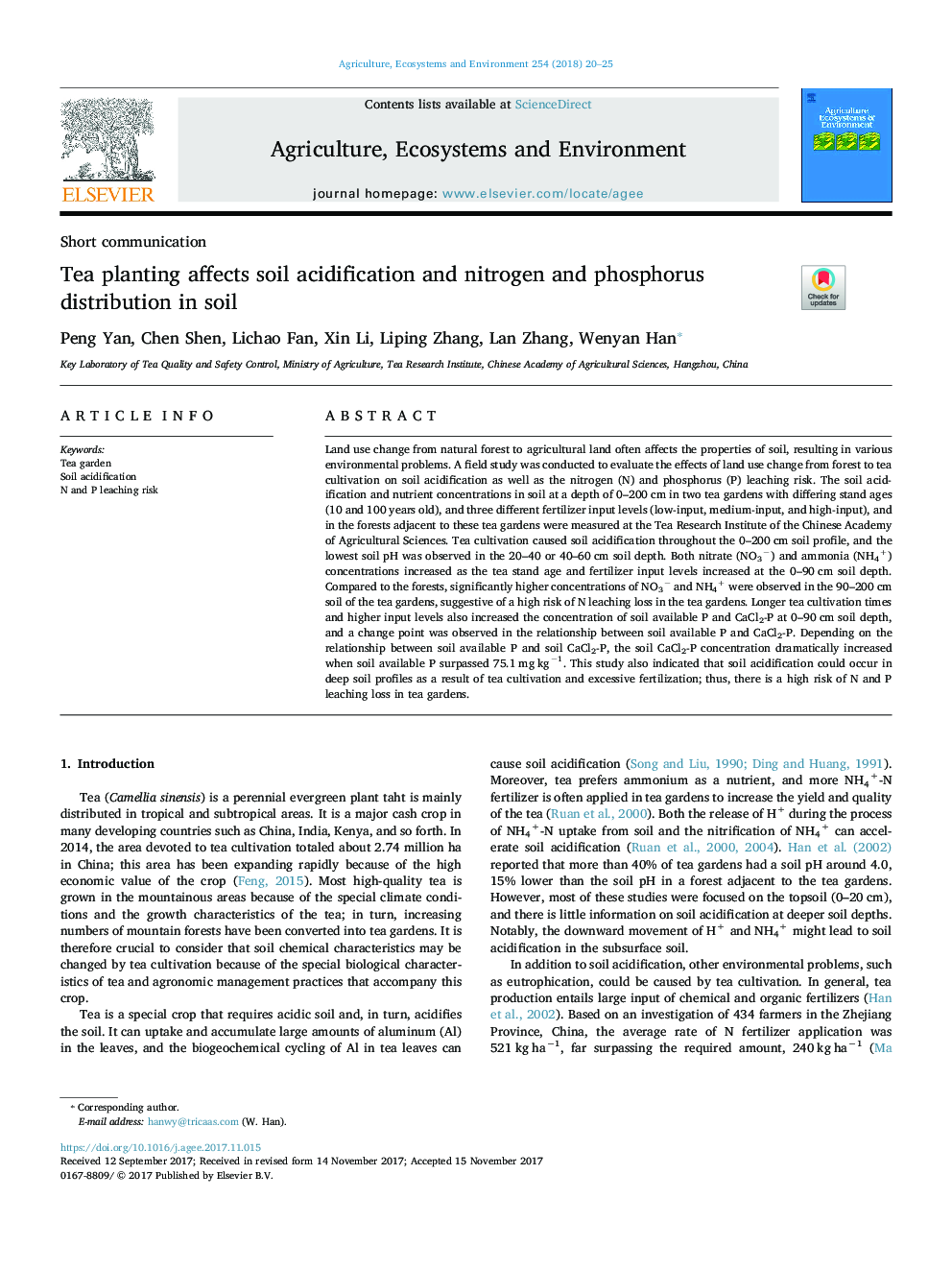| کد مقاله | کد نشریه | سال انتشار | مقاله انگلیسی | نسخه تمام متن |
|---|---|---|---|---|
| 8487197 | 1551998 | 2018 | 6 صفحه PDF | دانلود رایگان |
عنوان انگلیسی مقاله ISI
Tea planting affects soil acidification and nitrogen and phosphorus distribution in soil
ترجمه فارسی عنوان
کاشت چای بر اسیدی شدن خاک و توزیع نیتروژن و فسفر در خاک تاثیر می گذارد
دانلود مقاله + سفارش ترجمه
دانلود مقاله ISI انگلیسی
رایگان برای ایرانیان
کلمات کلیدی
باغ چای، اسیدی شدن خاک، ریسک نشت و پاشش،
موضوعات مرتبط
علوم زیستی و بیوفناوری
علوم کشاورزی و بیولوژیک
علوم زراعت و اصلاح نباتات
چکیده انگلیسی
Land use change from natural forest to agricultural land often affects the properties of soil, resulting in various environmental problems. A field study was conducted to evaluate the effects of land use change from forest to tea cultivation on soil acidification as well as the nitrogen (N) and phosphorus (P) leaching risk. The soil acidification and nutrient concentrations in soil at a depth of 0-200 cm in two tea gardens with differing stand ages (10 and 100 years old), and three different fertilizer input levels (low-input, medium-input, and high-input), and in the forests adjacent to these tea gardens were measured at the Tea Research Institute of the Chinese Academy of Agricultural Sciences. Tea cultivation caused soil acidification throughout the 0-200 cm soil profile, and the lowest soil pH was observed in the 20-40 or 40-60 cm soil depth. Both nitrate (NO3â) and ammonia (NH4+) concentrations increased as the tea stand age and fertilizer input levels increased at the 0-90 cm soil depth. Compared to the forests, significantly higher concentrations of NO3â and NH4+ were observed in the 90-200 cm soil of the tea gardens, suggestive of a high risk of N leaching loss in the tea gardens. Longer tea cultivation times and higher input levels also increased the concentration of soil available P and CaCl2-P at 0-90 cm soil depth, and a change point was observed in the relationship between soil available P and CaCl2-P. Depending on the relationship between soil available P and soil CaCl2-P, the soil CaCl2-P concentration dramatically increased when soil available P surpassed 75.1 mg kgâ1. This study also indicated that soil acidification could occur in deep soil profiles as a result of tea cultivation and excessive fertilization; thus, there is a high risk of N and P leaching loss in tea gardens.
ناشر
Database: Elsevier - ScienceDirect (ساینس دایرکت)
Journal: Agriculture, Ecosystems & Environment - Volume 254, 15 February 2018, Pages 20-25
Journal: Agriculture, Ecosystems & Environment - Volume 254, 15 February 2018, Pages 20-25
نویسندگان
Peng Yan, Chen Shen, Lichao Fan, Xin Li, Liping Zhang, Lan Zhang, Wenyan Han,
